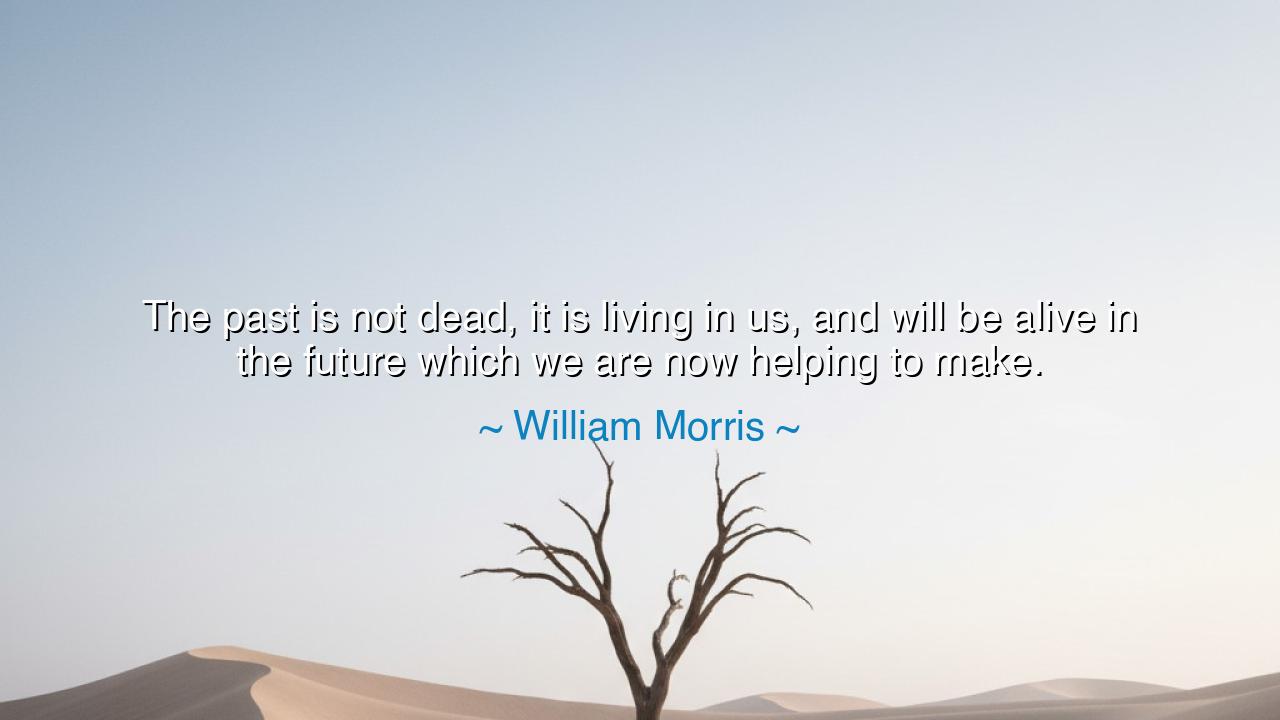
The past is not dead, it is living in us, and will be alive in
The past is not dead, it is living in us, and will be alive in the future which we are now helping to make.






In the vast and unbroken river of time, the past is not a distant land to be left behind, but a living, breathing entity that flows through our veins and shapes our every action. William Morris, a visionary and creator of beauty, spoke words that echo the wisdom of the ancients: "The past is not dead, it is living in us, and will be alive in the future which we are now helping to make." These words reveal a profound truth—that the past is not merely something to be remembered or studied, but an active, vibrant force that lives within us, influencing our choices and shaping the future we are now creating.
The ancient Greek philosophers understood this truth well. Heraclitus famously declared, "You cannot step into the same river twice," for the river is always changing, flowing forward. Yet, though the river is ever-changing, it is also connected to its source. The past, like the river’s origin, flows into the present and onward into the future. To understand ourselves, we must not only look ahead, but we must also honor the flow that has brought us to this moment. The past is not separate from us; it is woven into the fabric of who we are. The future, then, is not something detached from the present but an extension of everything that has come before.
This truth is beautifully illustrated in the story of the Buddha, who, upon sitting under the Bodhi tree, attained enlightenment not by rejecting the past, but by embracing it. He looked deeply into the world and recognized that the actions of the past—both his and others'—had shaped his present state. His path to enlightenment was not a rejection of his human experience, but a profound understanding that the past lives in us, influencing our perceptions, our choices, and the very course of our lives. The Buddha’s wisdom lies in his recognition that we cannot escape the past, but we can transform it through awareness, compassion, and understanding.
Consider the story of Nelson Mandela, whose life spanned decades of oppression, struggle, and, ultimately, triumph. Though he spent 27 years in prison, he did not allow the past to defeat him. Instead, Mandela understood that the legacy of his struggle was not just in the suffering he endured, but in the hope he carried forward. His actions and choices in the present were shaped by the lessons of the past—lessons of resilience, forgiveness, and vision. By embracing the past, not as something to regret, but as a source of strength, Mandela helped to create a future where peace and reconciliation could take root. He understood that the past lives in us, and in doing so, the past became a powerful force for shaping the future.
Morris’s words also serve as a reminder that we, too, are shaping the future through the choices we make today. Each action, each decision, ripples forward into the lives of those who will come after us. The legacy we leave will be felt long after we are gone, not only in the history books, but in the very fabric of society, culture, and individual lives. Our actions today, whether small or grand, are seeds planted in the soil of the future. It is in this way that the past is alive in us, and the future is molded by the present. We are not mere witnesses to time, but active participants in its unfolding.
The lesson here is clear: if we wish to create a future that is just, compassionate, and enlightened, we must first honor the past. We must not be ashamed of it, nor allow it to hold us back, but instead, we must learn from it, draw strength from it, and carry it forward into the world we are creating. Every story, every challenge, every triumph from the past is a part of the tapestry that makes us who we are. It is through understanding our past—both the painful and the glorious—that we can shape a future that reflects the wisdom we have gained.
In your own life, take the time to reflect on the past, not as something to escape, but as a source of power. What lessons can you learn from the actions of those who have gone before you? What wisdom do you carry with you, and how will you use it to shape the future? Remember that the choices you make today are the ones that will live on, not only in your own life, but in the lives of those who will follow. Live with intention, knowing that you are both shaped by the past and shaping the future. Honor your legacy, and in doing so, you will create a future that is rich with meaning, strength, and wisdom.






AAdministratorAdministrator
Welcome, honored guests. Please leave a comment, we will respond soon